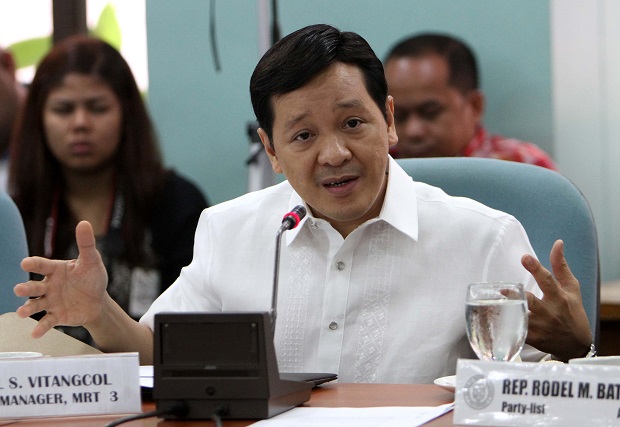Former Metro Rail Transit (MRT-3) General Manager Al Vitangcol III was arraigned on Wednesday on his graft charges over the alleged MRT maintenance contract mess.
During the hearing before the anti-graft court Third Division, Vitangcol said he was compelled not to enter a plea because he arrived in court without a counsel.
Vitangcol said he has not found a lawyer willing to represent him because some counsels refused to represent him in the high-profile graft case.
“I’m still in the process of engaging a competent legal counsel for the case… Some of the lawyers I approached refused, they don’t want to accept the case because it’s a high-profile case,” Vitangcol told the court.
He asked the court for 30 days for him to find a lawyer before undergoing arraignment.
But Division chair and Sandiganbayan Presiding Justice Amparo Cabotaje-Tang said the court cannot defer Vitangcol’s arraignment because he does not have a pending incident for the court to resolve.
Tang appointed a lawyer present in the court to represent Vitangcol for his arraignment.
The court arraigned Vitangcol after it found probable cause to try him for two counts of graft and one count of violating the procurement law.
Ombudsman charged Vitangcol of graft for awarding without public bidding the maintenance contract for MRT-3 to Philippine Trans Rail Management and Services Corp. (PH Trams).
READ: Ex-MRT chief, 5 others indicted for graft
The Ombudsman also charged Vitangcol for failing to disclose that one of the incorporators of PH Trams – Arturo Soriano – is his wife’s uncle. Soriano is now a provincial accountant of Pangasinan.
In a 39-page Resolution, Ombudsman Conchita Carpio Morales found probable cause to charge Vitangcol and PH Trams incorporators Wilson De Vera, Soriano, and Marlo Dela Cruz, Manolo Maralit, and Federico Remo.
The court deferred the graft arraignment of De Vera and Soriano due to their pending motions for reconsideration.
Meanwhile, Dela Cruz, Maralit and Remo pleaded not guilty for graft and violation of the procurement law.
They are charged of violating Sections 3(e) and 3(h) of the Anti-Graft and Corrupt Practices Act and Section 65(c)(1) of the Government Procurement Reform Act, arising from the MRT-3 interim maintenance contract.
Aside from the contract mess, the MRT is beset with operational breakdowns, delays, and long lines of passengers daily.
According to the Ombudsman, Vitangcol used his powers and authority as general manager, chief end-user, head of the negotiating team, and member of the Bids and Awards Committee (BAC), all at the same time, “to dictate the proponents invited for the preliminary negotiations” of the maintenance services.
Vitangcol also “intentionally hid his [affinitive] relationship with Soriano, which would have automatically disqualified PH Trams.”
The Ombudsman also said the PH Trams incorporators were liable for executing a false Affidavit of Disclosure dated Aug. 12, 2012 which stated that none of the incorporators are related by affinity with any member of the procurement teams.
The Ombudsman found no merit in Soriano’s claim that he divested his interests in PH Trams on Sept. 10, 2012 because no waiver was recorded in the Securities and Exchange Commission. Soriano’s claim also run counter to his Statement of Assets and Liabilities Net Worth where he declared that he obtained an interest as PH Trams stockholder in Nov. 2012.
Vitangcol and De Vera were accused of extorting $30 million from Inekon Group CEO and chair Josef Husek at the residence of then Czech Ambassador to the Philippines Josef Rychtar in exchange for granting Inekon the P3.7-billion contract to supply 48 coaches for the MRT-3 expansion. The money was later reduced to $2.5 million.
The Ombudsman is still investigating the alleged bribery.
READ: Ombudsman to probe Vitangcol for bribe try
According to the Ombudsman investigation, the contract was awarded to PH Trams in a negotiated procurement on Oct. 2012 even though there was no emergency situation to justify it.
The MRT management entered into an interim maintenance contract with PH Trans in joint venture with CB&T in Oct. 2012, after deciding not to renew the contract with original maintenance provider Sumitomo Corp.
The contract, which was renewed three times until Sept. 2013, was worth $1.15 million monthly.
Securities and Exchange Commission records also showed that PH Trams was two months old when the project was awarded, having been incorporated only on Aug. 2012 with a paid-up capital of only P625,000.00.
READ: MRT fiasco: Vitangcol indicted for graft, Abaya spared
In his motion for reconsideration, Vitangcol questioned why Transportation Secretary Joseph Emilio Abaya was not included in the graft indictment.
Abaya is also acting Liberal Party president.
“Vitangcol performed the duties as general manager of MRT-3… It was the DOTC, which decided to proceed with the interim award… It is just unfortunate that Vitangcol suddenly took all the blame in the contract where he is merely a part of the team,” his motion said.
READ: Why spare Abaya? Vitangcol asks Ombudsman
Section 3(e) of R.A. No. 3019 prohibits public officials from causing any undue injury to any party, including the Government, or giving any private party any unwarranted benefits, advantage or preference in the discharge of his official administrative or judicial functions through manifest partiality, evident bad faith or gross inexcusable negligence.
Meanwhile, Section 3(h) of the antigraft law prohibits public officials from directly or indirectly having financial or pecuniary interest in any business, contract or transaction in connection with which he intervenes or takes part in his official capacity, or in which he is prohibited by the Constitution or by any law from having any interest.
Section 65(c)(1) of R.A. 9184 punishes the act of “submit[ting] eligibility requirements of whatever kind and nature that contain false information or falsified documents calculated to influence the outcome of the eligibility screening process or conceal such information in the eligibility requirements when the information will lead to a declaration of ineligibility from participating in public bidding.”
